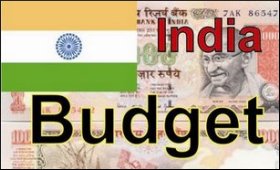|

|
Budget: A manuscript of good intentions?
|
|

|
|
| Top Stories |
 |
|
|
|
Arvind Padmanabhan | 16 Mar, 2012
It has made all the right noises about the need to reform and prune subsidies, and even extends incentives to tax payers. But without targets, Finance Minister Pranab Mukherjee's 7th union budget remains a manuscript of good intentions for the Indian economy.
Yes, each of India's 35 million tax payers stands to gain at least Rs.2,000 (USD 40) annually and some among them will benefit from the revision in income tax slabs. Many also stand to profit from the new scheme that provides incentives on investment in equities.
But all these minor gains get wiped out by the hike of 2 percentage points in virtually every service, as also the revision in the standard excise duty rate from 10 percent to 12 percent, which Mukherjee proposes in the budget tabled in the Lok Sabha Friday.
That leaves one to turn to the other aspects of the budget -- fiscal consolidation, how to nurse the economy back into shape, lower the subsidy bill and kick-start the reforms programme that seems to lie in state for quite some time now.
Here, the budget is full of just promises. Mukherjee himself says there is need to "bite the bullet" but does not actually do so in a clear sign that his Congress paty has been unable to convince the allies within the United Progressive Alliance (UPA) government.
In fact, there were great expectations, not just because the UPA's second stint is well past the mid-way mark of its tenure, but also since this national budget will run co-terminus with the first year of the country's 12th Five Year Plan.
The Economic Survey, authored by finance ministry's Chief Economic Advisor Kaushik Basu, and the monetary policy review of the Reserve Bank of India (RBI) had also prescribed a host of measures to ensure high growth for the Indian economy. But there appears to be little action on them.
There is no timeline for introducing a pan-India goods and services tax and direct tax code. There is only a reiteration of intention to introduce bills to open up pension, insurance and banking sectors. On black money, he just promises a white paper.
Even on subjects like allowing foreign airlines to particpate in the domestic aviation sector and overseas capital into multi-brand retailing, there is the same, all-familiar line: The government is trying to build consensus among difficult and ideologically incompatible allies and decision will be taken soon.
So when the Sensex fell 200 points Friday, it was no surprise.
Let us also look at fiscal consolidation. At 5.1 percent of gross domestic product, the fiscal deficit is alarmingly high. While Mukherjee argues it is lower than the revised estimate of 5.9 percent for this fiscal, it is well above 4.6 percent projected earlier.
But there are, indeed, positive sides to the budget, especially on the issue of helping the corporate sector raise funds at competitive rates globally, higher allocations for infrastructure development and social sectors, and an affirmation on pruning subsidies.
The finance minister also says the subsidy bill will be brought down to 2 percent of GDP and further down to 1.75 percent over the next three years, while also promising direct transfer of food, fertiliser and fuel doles to the intended beneficiaries.
Yet, given his own initial assessment that the Indian economy was clearly on the road of recovery with growth pegged at 7.6 percent for the next fiscal, and that inflation would be lower next year, one expected much, much more from the USD 300-billion budget.
"Whether or not today's announcements make tomorrow morning's headlines matters little, as long as they help in shaping the headlines that describe India a decade from now," the finance minister said in conclusion of his 110-minute speech.
Perhaps, as a veteran of seven budgets, Mukherjee knew how the news will be played out. On that count, Railway Minister Dinesh Trivedi was better off. With a fare hike, he did what others did not dare for past 10 years -- knowing well he was going to lose his job.
|
|
|
| |
|
|
|
|
|
|
|
|
|
|
|
|
|
|
| |
| Customs Exchange Rates |
| Currency |
Import |
Export |
US Dollar
|
84.35
|
82.60 |
UK Pound
|
106.35
|
102.90 |
Euro
|
92.50
|
89.35 |
| Japanese
Yen |
55.05 |
53.40 |
| As on 12 Oct, 2024 |
|
|
| Daily Poll |
 |
 |
| Do you think Indian businesses will be negatively affected by Trump's America First Policy? |
|
|
|
|
|
| Commented Stories |
 |
|
|
|
|
|
| |
|